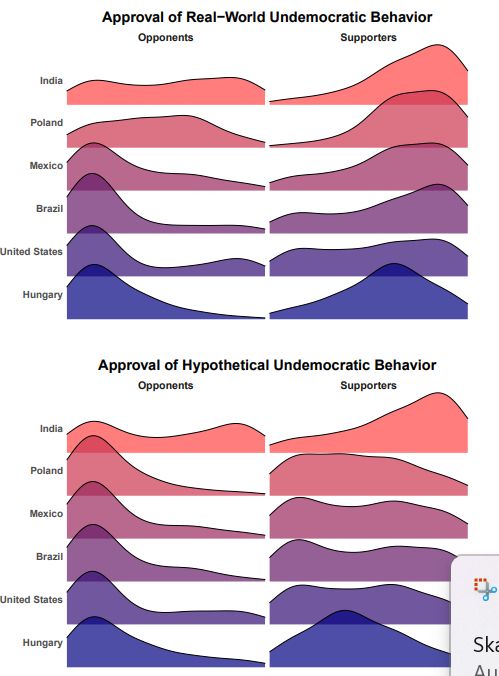Kristian Frederiksen
@kristianvsf.bsky.social
Assistant professor at Aarhus University. Democratic erosion, citizens & elites. Webpage: https://sites.google.com/view/kristianfrederiksen
November 4, 2025 at 5:48 AM
Thank you! I think subtle but important difference, if I understand your project correctly, is that while you explore whether people make trade-offs, we will look into whether they perceive these trade-offs to exist. The projects should complement each other nicely and it would be great to chat.
October 24, 2025 at 8:07 AM
Thank you! I think subtle but important difference, if I understand your project correctly, is that while you explore whether people make trade-offs, we will look into whether they perceive these trade-offs to exist. The projects should complement each other nicely and it would be great to chat.
Thanks a lot Elena!
October 23, 2025 at 2:15 PM
Thanks a lot Elena!
Stort tillykke! Meget velfortjent.
May 21, 2025 at 5:46 AM
Stort tillykke! Meget velfortjent.
In sum, we suggest that:
• To measure real support for transgressions and building interventions, embed violations in reality (for external validity).
• To isolate causal effects of undemocratic acts themselves, abstract hypotheticals remain useful due to information equivalence concerns.
• To measure real support for transgressions and building interventions, embed violations in reality (for external validity).
• To isolate causal effects of undemocratic acts themselves, abstract hypotheticals remain useful due to information equivalence concerns.
May 14, 2025 at 10:06 AM
In sum, we suggest that:
• To measure real support for transgressions and building interventions, embed violations in reality (for external validity).
• To isolate causal effects of undemocratic acts themselves, abstract hypotheticals remain useful due to information equivalence concerns.
• To measure real support for transgressions and building interventions, embed violations in reality (for external validity).
• To isolate causal effects of undemocratic acts themselves, abstract hypotheticals remain useful due to information equivalence concerns.
Why? Hypothetical scenarios might suffer from a “ceiling effect”—most people already oppose abstract violations, so there’s little room to move them further. This is pretty crucial as many interventions have failed in prior studies.
May 14, 2025 at 10:06 AM
Why? Hypothetical scenarios might suffer from a “ceiling effect”—most people already oppose abstract violations, so there’s little room to move them further. This is pretty crucial as many interventions have failed in prior studies.
In Wave 2, we nudge respondents with an intervention showing data on how many co‐citizens disapprove of democratic transgressions (plus their reasons). Against real‐world transgressions, disapproval jumped by +5 pp. But against hypotheticals, it barely moved—and even showed a tiny backlash.
May 14, 2025 at 10:06 AM
In Wave 2, we nudge respondents with an intervention showing data on how many co‐citizens disapprove of democratic transgressions (plus their reasons). Against real‐world transgressions, disapproval jumped by +5 pp. But against hypotheticals, it barely moved—and even showed a tiny backlash.
Descriptive findings (Wave 1): Disapproval of real‐world violations was much lower (47.5%) than for hypothetical ones (63.7%). Familiarity, concreteness, and context really amplify partisan biases, which are heavily underestimated with hypothetical scenarios, *even when keeping party constant*.

May 14, 2025 at 10:06 AM
Descriptive findings (Wave 1): Disapproval of real‐world violations was much lower (47.5%) than for hypothetical ones (63.7%). Familiarity, concreteness, and context really amplify partisan biases, which are heavily underestimated with hypothetical scenarios, *even when keeping party constant*.
We ran a two‐wave survey: In Wave 1, respondents saw either (a) vignettes of actual transgressions by well‐known leaders—think Trump’s election denial or Orbán’s electoral tweaks—or (b) parallel, but purely hypothetical, scenarios by hypothetical actors with assigned party.
May 14, 2025 at 10:06 AM
We ran a two‐wave survey: In Wave 1, respondents saw either (a) vignettes of actual transgressions by well‐known leaders—think Trump’s election denial or Orbán’s electoral tweaks—or (b) parallel, but purely hypothetical, scenarios by hypothetical actors with assigned party.
The reason is that information equivalence concerns shift once the main goal is not isolating effects *of* democratic violations (for interventions, for example, we are estimating effects *on* support for democratic violations - such that only intervention treatments should be equivalent).
May 14, 2025 at 10:06 AM
The reason is that information equivalence concerns shift once the main goal is not isolating effects *of* democratic violations (for interventions, for example, we are estimating effects *on* support for democratic violations - such that only intervention treatments should be equivalent).

